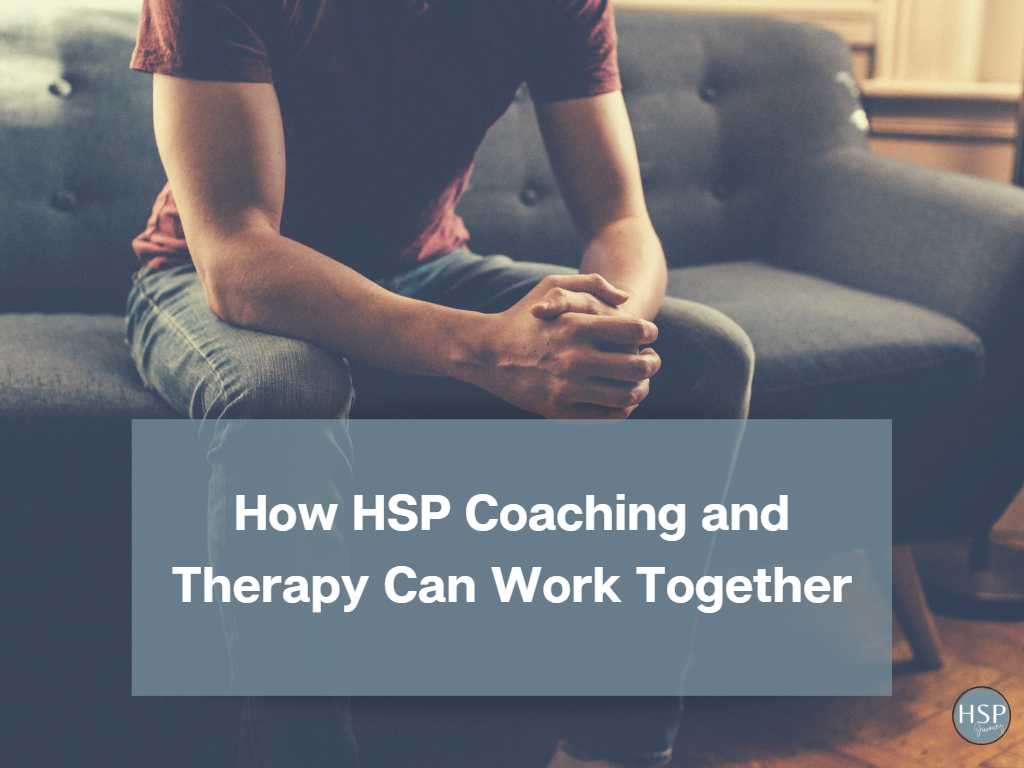Whether you just learned that you’re a Highly Sensitive Person or have known for a while, you might be looking for the best ways to attain support and which route to go to. It may give you comfort to know that HSP coaching and therapy can work together to help you find the help you need to thrive. While they may seem similar, there are some big differences, including the focus, length of time you receive the service, and payment method.

Table of Contents
A Key Difference Between HSP Coaching and Therapy
Therapy is appropriate for people who already have, or have symptoms of, a mental health diagnosis such as anxiety, depression, PTSD, bipolar disorder, or some other mental health diagnosis. HSP coaching is for Highly Sensitive People who either do not have a mental health diagnosis, have already gone to therapy and have the coping skills in place, or are currently in therapy. Coaches are not therapists (although many therapists are also coaches), so they cannot treat mental health diagnoses.
Something to consider if you are thinking about starting therapy: it is absolutely okay to “test out” therapists to find someone with whom you feel comfortable. If you meet with someone and feel like they’re not a good fit for you, you’re not going to hurt their feelings by finding someone else. Many studies have found that the biggest predictor of positive change in therapy is the therapeutic relationship, so feeling comfortable with your therapist is extremely important.

Become an HSP-Trained Coach with certification from the Nickerson Institute. This course is for professionals working with Highly Sensitive People. It covers various assessments, mistaken conditions, health-related issues, and challenges with identity, relationships, boundaries, as well as traditional/alternative therapies.
Short-Term vs. Long-Term HSP Coaching and Therapy
Therapy is often, but not always, a long-term process lasting from a few months to years. The focus of therapy is on the past, and the present and can be about working through past traumas, finding healthy coping skills to manage a mental health diagnosis, learning effective communication skills, learning about unhealthy patterns (behaviors and thought patterns), emotions, and more. Therapists ask open-ended questions that can lead the client to new realizations. Overall, therapists are there to be active listeners and give clients a nonjudgmental space to process their thoughts and feelings and support the client with appropriate skills to help them reach their therapy goals.
Coaching is often a short-term process. The work in coaching focuses on the future and how the coach can support the client to take action steps to reach their goals. Coaches ask questions that focus on the client’s specific goal, and HSP coaching can focus on a variety of goals such as putting a self-care plan in place, setting boundaries, communicating needs to others, and exploring what it means to be a Highly Sensitive Person in a world not built for highly sensitive people.

Insurance vs. Self-Pay for HSP Coaching and Therapy
Therapists can bill for insurance (although some are self-pay only) and can only meet with clients in the state in which they are licensed. Coaches cannot bill for insurance and can meet with anyone, regardless of where they live. Many therapists as well as coaches meet virtually using phone or video. Therapists must abide by the rules of the state in which they practice.

Looking for an HSP-Trained coach to help you align your life with your priorities?
Through my Highly Sensitive Person (HSP) certification with the Nickerson Institute, as well as being an HSP, I offer HSP coaching to develop specific goals around your HSP needs. We HSPs frequently deal with anxiety and overstimulated nervous systems that prevent us from achieving peace and attaining our life goals. HSP coaching with me includes a detailed review of your sensitivities and a mutually-desired plan for growth and management of this superpower to shift negativity and begin seeing yourself as the hero of your own story. (Affordable monthly coaching begins at $150/month.)
When are HSP Coaching and Therapy appropriate?
Because therapy and coaching have different focuses, sometimes it can be beneficial to do both. For example, if you are experiencing intense anxiety, you might start seeing a therapist who has heard about the trait of high sensitivity, and they tell you that they think you’re highly sensitive.
But maybe that’s the extent of their knowledge about high sensitivity, and you want to learn more about what this means for you and what you can do to support yourself as an HSP—this is where coaching comes in. An HSP coach can help you figure out what being an HSP means to you, can help you figure out strategies to support you, and can help you come up with a plan to implement the strategies. So now you are working on coping with your anxiety in therapy and strategies to support you as an HSP in coaching—together these offer wonderful support.
If you feel it is helpful, you could even sign a release with your therapist so that they can communicate with your HSP coach in order for both of them to be up to date with what you’ve been working on and make sure that they are working together to support you; it may also be helpful to have your HSP coach educate your therapist about, for example, how HSPs can become easily overwhelmed, which can have signs very similar to that of anxiety (unfortunately, the trait of high sensitivity is not taught to therapists in graduate school, so many don’t even know that it exists, which is really too bad since many clients AND therapists are highly sensitive people).
There is no such thing as too much support, and working with both a therapist and a coach gives you two people to hold you accountable in two different aspects of your growth.
Final Thoughts
While there are similarities and differences between therapy and HSP coaching, it is up to the individual to figure out which is appropriate for them (or if both are). If you want to work through past trauma, are experiencing stress, or have a mental health diagnosis, then therapy is appropriate. Therapy focuses on the past and present, is often a long-term process, and therapists can take insurance or self-pay.
Coaching focuses on the future, is action-oriented, is often a short-term process focusing on a specific goal, and is self-pay only. Whether you decide to pursue therapy, HSP coaching, or both, reaching out for support can be a tough step to take, so take a minute to acknowledge your step in the right direction to get the support you need.
How do I know if I’m a Highly Sensitive Person (HSP)?
This is a great question. Many people who are highly sensitive feel that they were not understood as children. They were frequently told they were too sensitive or cried too often. You can reference our list of HSP quizzes to see how you score and this can inform whether or not you are a Highly Sensitive Person.
Be sensitive, be free
*This post contains affiliate links and I will be compensated if you make a purchase after clicking on my links*





[…] than a hindrance. But, I didn’t always feel this way. Several years back, I worked with an HSP Coach who suggested I was a multipotentialite. I hadn’t heard of the term before and it intrigued […]